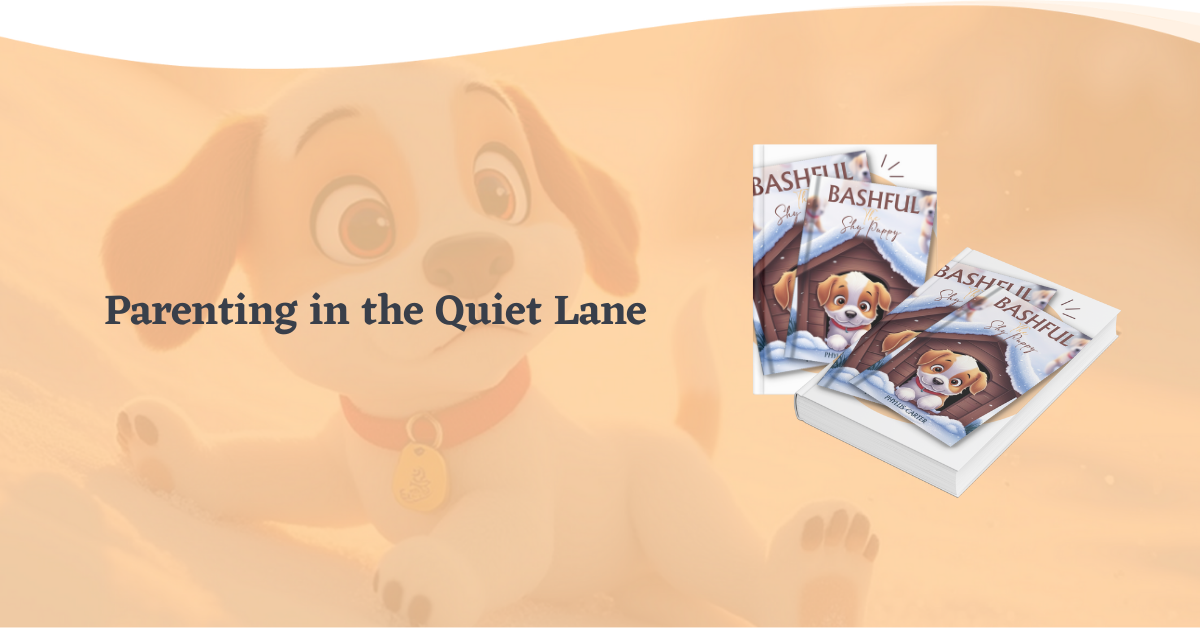My son has always been a quiet person. He seemed more at ease watching the world than asking for its attention, even as a baby. While other toddlers would run into new places, he would stand in the doorway with my hand in his and look at everything before deciding to move. I used to think it was my job to help him get out of his shell. Being reserved meant missing out. What I did not understand then was that his way of moving through the world was not a problem to fix but a gift to protect.
That shift in understanding began the night we read Bashful the Shy Puppy together. I had picked it up thinking it might be a sweet bedtime story, nothing more. The illustrations caught his attention right away. He lingered on the page showing Bashful in the middle of his litter, smaller than the rest, looking away from the playful chaos. My son studied that page for so long, I thought he might be lost in it.
The first time through, he barely spoke. He listened as Bashful hesitated to join in, finding comfort in quiet moments, and faced a snowy day that would test his courage. When we closed the book, he simply said goodnight. But the next morning, he asked if we could reread it. This time, he had questions. Why did Bashful not play with the others? Was he scared? What made him help in the end?
We talked about fear and about how sometimes people act not because they feel ready but because someone they love needs them. He slowly nodded, as if he were putting that thought away. I started to see small changes over the next few weeks. Without me telling him to, he walked over to the swing at the playground and pushed another child. He told us about how he helped a classmate find their missing lunchbox while we were eating. These times weren’t loud or big, but they felt huge to me.
Parenting a reserved child means learning to see progress in these small steps. It is easy to overlook them if you are only searching for significant changes. Bashful the Shy Puppy gave us a shared language for bravery that made those steps visible. It taught both of us that courage can be quiet, and that does not make it any less real.
There is a scene in the book where the snow is falling thick and fast, and Bashful has to decide whether to stay where he feels safe or step forward to help. My son pointed to that page one night and said, “That’s like me when I try something new at school.” I asked if it felt scary. He nodded. Then he said, “But sometimes I do it anyway.”
That moment stayed with me. It made me think about how important it is to praise our kids for being brave, even if they don’t do it the way we expect them to. Our culture too often praises the loudest people and the most obvious risks. But the child who moves at their own pace, picks their moment carefully, and acts out of care instead of competition is strong in a different way.
I was worried that my son was too quiet and that it would hold him back before I read Bashful’s story. I see it differently now. These are not limits on his ability to watch, listen, and think before he acts. They are good things. They make him aware of things that most people overlook. As his parent, it’s not my job to change him; it’s my job to help him believe that his way is just as good as anyone else’s.
We still read the book together, though sometimes he reads it on his own. I find it on his nightstand, sometimes marked with a scrap of paper at his favorite scene. I think he returns to it for reassurance, just as I once returned to stories that helped me understand myself better. It has become more than a bedtime story; it is a touchstone for both of us.
For parents of quiet children, there is often a subtle pressure to prepare them for a world that rewards the bold. But I have learned that preparing my son does not mean trying to make him into something he is not. It means showing him examples of characters like Bashful, who succeed not by changing themselves but by trusting themselves.
When I watch him now, whether he is quietly drawing at the kitchen table or choosing to speak up in a small group, I see a child who knows his own pace. And I know that my job is not to make him go faster, but to walk with him and let him know that his steps, no matter how slow, are enough.
Bashful the Shy Puppy reminded me of that. It made me think that sometimes the best way to guide a child is not to push them but to be there for them. And as we walk together down this quiet lane, I’ve found more happiness than I ever thought I would.
